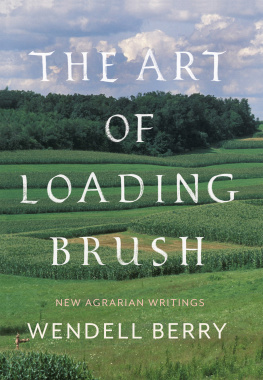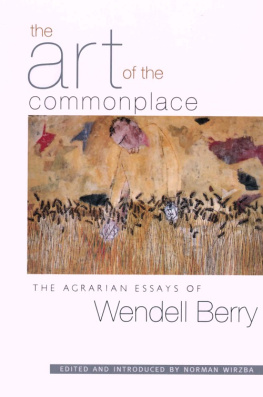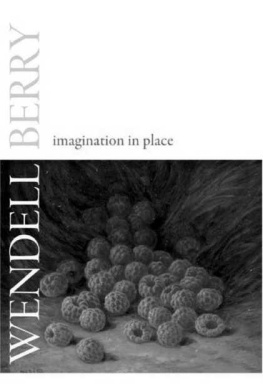Praise for The Achievement of Wendell Berry: The Hard History of Love
Wendell Berrys life and works are a sustaining oasis amid the turmoil and alienation that mar the moral landscape of our time. Fritz Oehlschlaeger has provided a brilliant guide to Berrys fiction, nonfiction, and poetry, tracing the consistent themes of good work, faith, patriotism, agrarian values, and love of the land and its people that flow through Berrys writings. To read this book is to fully understand why Wendell Berry is the conscience of modern America.
David Ehrenfeld, author of Becoming Good Ancestors: How We Balance Nature, Community, and Technology
A nearly comprehensive engagement with the work of Wendell Berry, who is without question one of Americas most important contemporary writers. This book will remain a significant contribution to scholarship on Berry for some time to come.
Joel James Shuman, coeditor of Wendell Berry and Religion: Heavens Earthly Life
If you want to learn from Wendell Berry, you must read him. After that, Fritz Oehlschlaegers remarkable book on Berrys work is the next best thing. This is because he writes not to characterize or peg Berry as a writer, but because he has learned from him and come to share deeply in his loves. Oehlschlaegers thematic ordering of Berrys extraordinarily imaginative and extensive corpus not only preserves the force of Berrys blazing insights but enhances them, providing connection and context. Berrys many gifts to our time, gifts that awaken and alarm, are here unwrapped with the deepest fidelity and love. Read Berry, then read Oehlschlaeger, and you will know why you must read Berry again, equipped with the understanding that what you are doing is a revolutionary act.
Charles R. Pinches, author of A Gathering of Memories: Family, Nation, and Church in a Forgetful World
Oehlschlaegers careful and respectful reading of Wendell Berry is a boon to anyone who values clear thinking, clear writing, and the empathic imagination. If reading Berry helps us see ourselves and our web of interactions with sobering clarity, reading Oehlschlaeger redoubles our appreciation of the mastery of Berrys expansive art and redemptive vision. Read both with pencil in hand.
Morris A. Grubbs, editor of Conversations with Wendell Berry
THE ACHIEVEMENT OF WENDELL BERRY
Culture of the Land: A Series in the New Agrarianism
This series is devoted to the exploration and articulation of a new agrarianism that considers the health of habitats and human communities together. It demonstrates how agrarian insights and responsibilities can be worked out in diverse fields of learning and living: history, science, art, politics, economics, literature, philosophy, religion, urban planning, education, and public policy. Agrarianism is a comprehensive worldview that appreciates the intimate and practical connections that exist between humans and the earth. It stands as our most promising alternative to the unsustainable and destructive ways of current global, industrial, and consumer culture.
Series Editor
Norman Wirzba, Duke University, North Carolina
Advisory Board
Wendell Berry, Port Royal, Kentucky
Ellen Davis, Duke University, North Carolina
Patrick Holden, Soil Association, United Kingdom
Wes Jackson, Land Institute, Kansas
Gene Logsdon, Upper Sandusky, Ohio
Bill McKibben, Middlebury College, Vermont
David Orr, Oberlin College, Ohio
Michael Pollan, University of California at Berkeley, California
Jennifer Sahn, Orion Magazine, Massachusetts
Vandana Shiva, Research Foundation for Science, Technology, and Ecology, India
Bill Vitek, Clarkson University, New York
THE ACHIEVEMENT OF
WENDELL BERRY
The Hard History of Love
Fritz Oehlschlaeger

Copyright 2011 by The University Press of Kentucky
Scholarly publisher for the Commonwealth,
serving Bellarmine University, Berea College, Centre
College of Kentucky, Eastern Kentucky University,
The Filson Historical Society, Georgetown College,
Kentucky Historical Society, Kentucky State University,
Morehead State University, Murray State University,
Northern Kentucky University, Transylvania University,
University of Kentucky, University of Louisville,
and Western Kentucky University.
All rights reserved.
Editorial and Sales Offices: The University Press of Kentucky
663 South Limestone Street, Lexington, Kentucky 40508-4008
www.kentuckypress.com
15 14 13 12 11 5 4 3 2 1
Library of Congress Cataloging-in-Publication Data
Oehlschlaeger, Fritz.
The achievement of Wendell Berry : the hard history of love / Fritz
Oehlschlaeger.
p. cm. (Culture of the land)
Includes bibliographical references and index.
ISBN 978-0-8131-3007-1 (hardcover : acid-free paper) ISBN 978-0-8131-3009-5 (ebook)
1. Berry, Wendell, 1934 Criticism and interpretation. I. Title.
PS3552.E75Z79 2011
818.5409dc22
2010053736
This book is printed on acid-free paper meeting the requirements of the American National Standard for Permanence in Paper for Printed Library Materials. | 
|
Manufactured in the United States of America.

| Member of the Association of American University Presses |
Contents
1. Practices, Particulars, and Virtues:
What Mules Taught Wendell Berry
2. Toward a Peaceable Economy for a Beloved Country:
Berry as Agrarian, Citizen, and Patriot
5. Remembering the Names: Andy Catlett, Nathan Coulter,
A World Lost, Remembering, and The Memory of Old Jack
6. Imagining the Practice of Peace in a Century of War:
A Place on Earth, Hannah Coulter, and Jayber Crow
Acknowledgments
I wish to begin by thanking Wendell Berry for the rich and honest work he has given, and continues to give, to his readers. I thank him, too, for his permission to quote more fully from the poems Dante and Sabbath VII, 2008 than fair scholarly use customarily allows. I am also grateful to my editors at the University Press of Kentucky, Laura Sutton, Ann Malcolm, and Ila McEntire, and to the press director, Stephen Wrinn, for their wonderful encouragement and kind suggestions about the book. The readers of the manuscript offered careful criticism that has helped me to make this a better book than it would have been otherwise, and for this I thank them.
Stanley Hauerwas and Norman Wirzba of Duke Divinity School read the manuscript and gave me important suggestions. My colleagues at Virginia Tech, Tom Gardner and Peter Graham, have been wonderful conversation partners over the years on all literary matters. I have learned a great deal from three groups of graduate students who have taken seminars with me devoted, in part, to Berrys work. In particular, I wish to thank Sarah Parker-Clever, from whom I learned much about Remembering as she did her masters capstone essay on that novel. I also want to thank Linda Patino and Jared Gibbs for their fine work as research assistants at different stages of the project.









